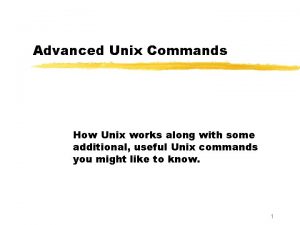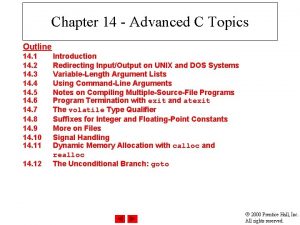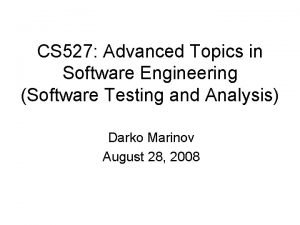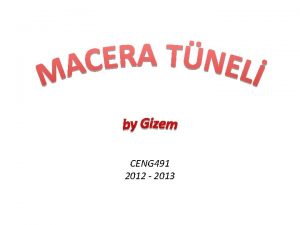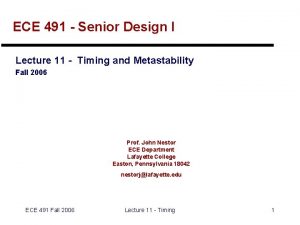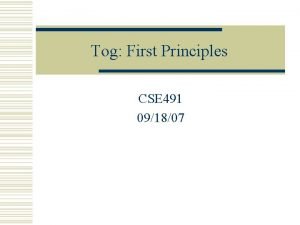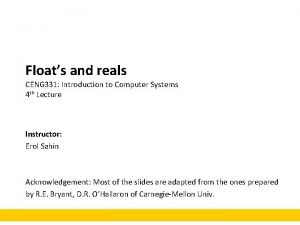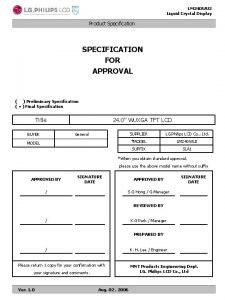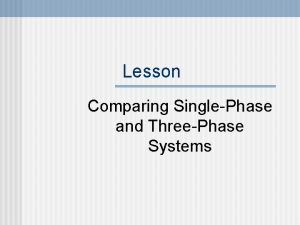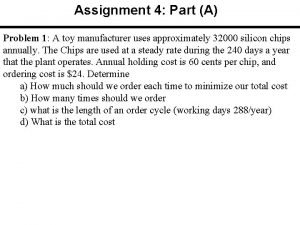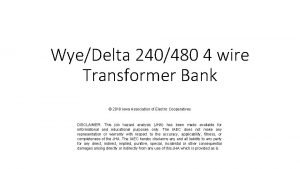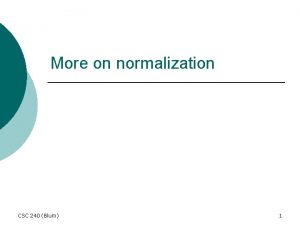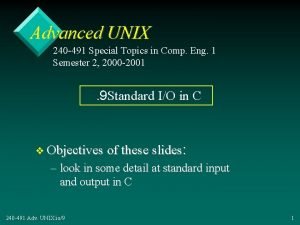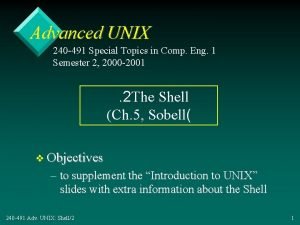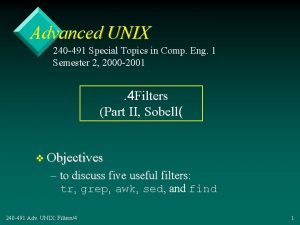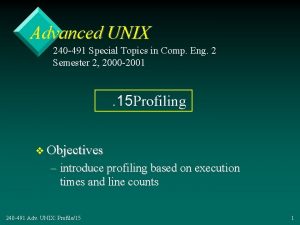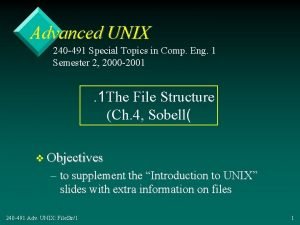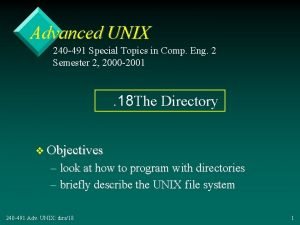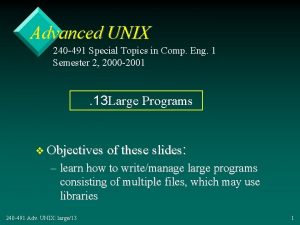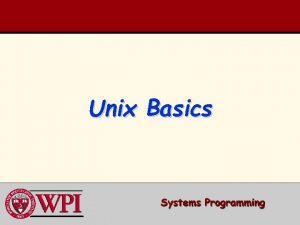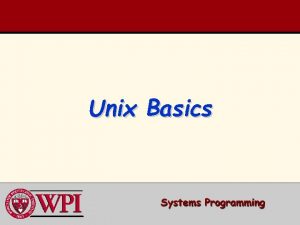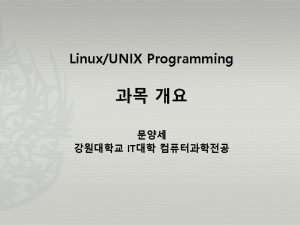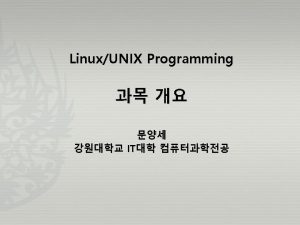Advanced UNIX 240 491 Special Topics in Comp


























![struct employee e 1, emps[MAX]; : : /* write the struct to fp */ struct employee e 1, emps[MAX]; : : /* write the struct to fp */](https://slidetodoc.com/presentation_image/ea29bf113f75ec89eeed7c84aad152f9/image-27.jpg)


















- Slides: 45

Advanced UNIX 240 -491 Special Topics in Comp. Eng. 1 Semester 2, 2000 -2001 . 10 File Processing v Objectives of these slides: – a more detailed look at file processing in C 240 -491 Adv. UNIX: fp/10 1

Overview. 1. 2. 3. 4. 5 240 -491 Adv. UNIX: fp/10 Background Text Files Error Handling Binary Files Direct Access continued 2

. 6. 7. 8. 9. 10 240 -491 Adv. UNIX: fp/10 Temporary Files Renaming & Removing Character Pushback Buffering Redirecting I/O 3

. 1 Background v Two types of file: text, binary v Two access methods: sequential, direct (also called random access( v UNIX I/O is line buffered – input is processed a line at a time – output may not be written to a file immediately until a newline is output 240 -491 Adv. UNIX: fp/10 4

. 2 Text Files v Standard I/O printf() scanf() gets() puts() getchar() putchar File I/O fprintf() fscanf() fgets() fputs() getc() putc() most just add a 'f' 240 -491 Adv. UNIX: fp/10 5

Function Prototypes v int fscanf(FILE *fp, char *format; (. . . , v int fprintf(FILE *fp, char *format; (. . . , v int fgets(char *str, int max, FILE *fp; ( v int fputs(char *str, FILE *fp; ( v int getc(FILE *fp; ( v int putc(int ch, FILE *fp; ( the new argument is the file pointer fp 240 -491 Adv. UNIX: fp/10 6

. 2. 1 Standard FILE* Constants v Name stdin stdout stderr Meaning standard input standard output standard error v e. g. if (len >= MAX_LEN) fprintf(stderr, “String is too longn; (” 240 -491 Adv. UNIX: fp/10 7

. 2. 2 Opening / Closing v FILE *fopen(char *filename, char *mode; ( v int fclose(FILE *fp; ( v fopen() modes: Mode “r” “w” “a” 240 -491 Adv. UNIX: fp/10 Meaning read mode write mode append mode 8

Careful Opening v FILE *fp; /* file pointer */ char *fname = “myfile. dat”; if ((fp = fopen(fname, “r”)) == NULL) { fprintf(stderr, “Error opening %sn”, fname); exit(1); }. . . /* file opened okay/* 240 -491 Adv. UNIX: fp/10 9

. 2. 3 Text I/O v As with standard I/O: – formatted I/O – line I/O – character I/O 240 -491 Adv. UNIX: fp/10 (fprintf, fscanf( (fgets, fputs( (getc, putc( 10

. 2. 3. 1 Formatted I/O v int fscanf(FILE *fp, char *format; (. . . , v int fprintf(FILE *fp, char *format; (. . . , v Both return EOF if an error or end-of-file occurs. v If okay, fscanf() returns the number of bound variables, fprintf() returns the number of output characters. 240 -491 Adv. UNIX: fp/10 11

. 2. 3. 2 Line I/O v char *fgets(char *str, int max, FILE *fp; ( v int fputs(char *str, FILE *fp; ( v If an error or EOF occurs, fgets() returns NULL, fputs() returns EOF. v If okay, fgets() returns pointer to string, fputs() returns non-negative integer. 240 -491 Adv. UNIX: fp/10 12

Differences between fgets() and gets() v Use of max argument: fgets() reads in at most max-1 chars (so there is room for ‘�. (’ v fgets() retains the input ‘n’ v Deleting the ‘n: ’ len 1 = strlen(line)-1; if (line[len 1] == ‘n’) line[len 1] = ‘�; ’ 240 -491 Adv. UNIX: fp/10 /* to be safe */ 13

Difference between fputs() and puts() v fputs() does not add a‘n’ to the output. 240 -491 Adv. UNIX: fp/10 14

Line-by-line Echo #define MAX 100 /* max line length */ : void output_file(char *fname) { FILE *fp; char line[MAX]; if ((fp = fopen(fname, “r”)) == NULL) { fprintf(stderr, “Error opening %sn”, fname); exit(1); } while (fgets(line, MAX, fp) != NULL) fputs(line, stdout); fclose(fp; ( { 240 -491 Adv. UNIX: fp/10 15

. 2. 3. 3 Character I/O v int getc(FILE *fp; ( v int putc(int ch, FILE *fp; ( v Both return EOF if an error or end-of-file occurs. v Can also use fgetc() and fputc. () 240 -491 Adv. UNIX: fp/10 16

Char-by-char Echo #define MAX 100 /* max line length */ : void output_file(char *fname) { FILE *fp; int ch; if ((fp = fopen(fname, “r”)) == NULL) { fprintf(stderr, “Error opening %sn”, fname); exit(1); } while ((ch = getc(fp)) != EOF) putc(ch, stdout); fclose(fp; ( { 240 -491 Adv. UNIX: fp/10 17

Using feof() v Rewrite the previous while-loop as: while (!feof(fp)) { ch = getc(fp); putc(ch, stdout; ( { – not a common coding style. 240 -491 Adv. UNIX: fp/10 18

. 3 Error Handling v int ferror(FILE *fp; ( – check error status of file stream – it returns non-zero if there is an error v void clearerr(FILE *fp; ( – reset error status 240 -491 Adv. UNIX: fp/10 continued 19

common in advanced coding v void perror(char *str; ( – print str (usually a filename) followed by colon and a system-defined error message v . . . fp = fopen(fname, “r”); if (fp == NULL) { perror(fname); exit(1; ( { 240 -491 Adv. UNIX: fp/10 20

errno v The system error message is based on a system error number (errno) which is set when a library function returns an error. v #include <errno. h>. . . fp = fopen(fname, “r”); if (errno(. . . ==. . . 240 -491 Adv. UNIX: fp/10 continued 21

v Many errno integer constants are defined in errno. h – it is better style to use the constant name instead of the number – linux distributions usually put most errno constants in asm/errno. h v Example errno constants: EPERM ENOENT 240 -491 Adv. UNIX: fp/10 permission denied no such file / directory 22

. 4 Binary Files v For storing non-character data – arrays, structs, integers (as bytes), GIFs, compressed data v Not portable across different systems – unless you have cross-platform reading/writing utilities, such as gzip v For portability, use text files 240 -491 Adv. UNIX: fp/10 23

fopen() modes for Binary Files v Mode “rb” “wb” “ab” Meaning read binary file write binary file append to binary file add a "b" to the text file modes 240 -491 Adv. UNIX: fp/10 24

Reading / Writing v int fread(void *buffer, int size, int num, FILE *fp); int fwrite(void *buffer, int size, int num, FILE *fp; ( v Returns number of things read/written (or EOF. ( 240 -491 Adv. UNIX: fp/10 25

Example v The code will write to a binary file containing employee records with the following type structure: #define MAX_NAME_LEN 50 struct employee { int salary; char name[MAX_NAME_LEN + 1; [ ; { 240 -491 Adv. UNIX: fp/10 continued 26
![struct employee e 1 empsMAX write the struct to fp struct employee e 1, emps[MAX]; : : /* write the struct to fp */](https://slidetodoc.com/presentation_image/ea29bf113f75ec89eeed7c84aad152f9/image-27.jpg)
struct employee e 1, emps[MAX]; : : /* write the struct to fp */ fwrite(&e 1, sizeof(struct employee), 1, fp); /* write all of the array with 1 op */ fwrite(emps, sizeof(struct employee), MAX, fp; ( 240 -491 Adv. UNIX: fp/10 27

. 5 Direct Access v Direct access: move to any record in the binary file and then read (you do not have to read the others before it. ( v e. g. a move to the 5 th employee record would mean a move of size: * 4 sizeof(struct employee( 5 th 240 -491 Adv. UNIX: fp/10 28

fopen() Modes for Direct Access(+) v Mode “rb+” Meaning open binary file for read/write “wb+” create/clear binary file for read/write “ab+” open/create binary file for read/write at the end 240 -491 Adv. UNIX: fp/10 29

Employees Example #include <stdio. h> #include <stdlib. h> #include <string. h> #define DF “employees. dat” #define MAX_NAME_LEN 50 struct employee { int salary; char name[MAX_NAME_LEN + 1]; }; int num_emps = 0; FILE *fp; : 240 -491 Adv. UNIX: fp/10 Poor style: global variables /* num of employees in DF */ 30

Data Format empty space of the right size number employees. dat e 1 e 2 e 3 e 4 . . . . v The basic coding technique is to store the number of employee currently in the file (e. g. 4( – some functions will need this number in order to know where the end of the data occurs 240 -491 Adv. UNIX: fp/10 31

Open the Data File void open_file(void) { if ((fp = fopen(DF, “rb+”)) == NULL) { fp = fopen(DF, “wb+”); /* create file */ num_emps = 0; /* initial num. */ } else /* opened file, read in num. */ fread(&num_emps, sizeof(num_emps), 1, fp; ( { 240 -491 Adv. UNIX: fp/10 32

Move with fseek() v int fseek(FILE *fp, long offset, int origin; ( v Movement is specified with a starting position and offset from there. v The current position in the file is indicated with the file position pointer (not the same as fp. ( 240 -491 Adv. UNIX: fp/10 33

Origin and Offset v fseek() origin values: Name Value SEEK_SET 0 SEEK_CUR 1 SEEK_END 2 Meaning beginning of file current position end of file v Offset is a large integer – can be negative (i. e. move backwards( – equals the number of bytes to move 240 -491 Adv. UNIX: fp/10 34

Employees Continued Can write anywhere void put_rec(int posn, struct employee *ep) /* write an employee at position posn */ { long loc; loc = sizeof(num_emps) + ((posn-1)*sizeof(struct employee)); fseek(fp, loc, SEEK_SET); fwrite(ep, sizeof(struct employee), 1, fp; ( { 240 -491 Adv. UNIX: fp/10 No checking to avoid over-writing. 35

Read in an Employee void get_rec(int posn, struct employee *ep) /* read in employee at position posn */ { long loc; loc = sizeof(num_emps) + ((posn-1)*sizeof(struct employee)); fseek(fp, loc, SEEK_SET); fread(ep, sizeof(struct employee), 1, fp; ( { 240 -491 Adv. UNIX: fp/10 should really check if ep contains something 36

Close Employees File void close_file(void) { rewind(fp); /* same as fseek(fp, 0, 0); */ /* update num. of employees */ fwrite(&num_emps, sizeof(num_emps), 1, fp); fclose(fp; ( { 240 -491 Adv. UNIX: fp/10 37

ftell() v Return current position of the file position pointer (i. e. its offset in bytes from the start of the file: ( long ftell(FILE *fp; ( 240 -491 Adv. UNIX: fp/10 38

. 6 Temporary Files v FILE *tmpfile(void); /* create a temp file */ char *tmpnam(char *name); /* create a unique name/* v tmpfile() opens file with “wb+” mode; removed when program exits 240 -491 Adv. UNIX: fp/10 39

. 7 Renaming & Removing v int rename(char *old_name, char *new_name; ( – like mv in UNIX v int remove(char *filename; ( – like rm in UNIX 240 -491 Adv. UNIX: fp/10 40

. 8 Character Pushback v int ungetc(int ch, FILE *fp; ( v Overcomes some problems with reading too much – 1 character lookahead can be coded v ungetc() only works once between getc() calls v Cannot pushback EOF 240 -491 Adv. UNIX: fp/10 41

. 9 Buffering v int fflush(FILE *fp; ( – e. g. fflush(stdout; ( v Flush partial lines – overcomes output line buffering v stderr is not buffered. 240 -491 Adv. UNIX: fp/10 42

setbuf() v void setbuf(FILE *fp, char *buffer; ( v Most common use is to switch off buffering: setbuf(stdout, NULL; ( – equivalent to fflush() after every output function call 240 -491 Adv. UNIX: fp/10 43

. 10 Redirecting I/O v FILE *freopen(char *filename, char *mode, FILE *fp; ( – opens the file with the mode and associates the stream with it v Most common use is to redirect stdin, stdout, stderr to mean the file v It is better style (usually) to use I/O redirection at the UNIX level. 240 -491 Adv. UNIX: fp/10 continued 44

v FILE *in; int n; in = freopen("infile", "r", stdin); if (in == NULL) { perror("infile"); exit(1); } scanf("%d", &n); /* read from infile */ : fclose(in; ( 240 -491 Adv. UNIX: fp/10 45
 Advanced unix commands
Advanced unix commands Advanced topics in web development
Advanced topics in web development Angular advanced topics
Angular advanced topics Android advanced topics
Android advanced topics Angular advanced topics
Angular advanced topics Advanced topics in computer science
Advanced topics in computer science Advanced c topics
Advanced c topics Advanced topics in software engineering
Advanced topics in software engineering Ceng 491
Ceng 491 Ece 491
Ece 491 Ba 491
Ba 491 Tog on interface
Tog on interface Ece 491
Ece 491 Pd 491
Pd 491 Mtbf formula
Mtbf formula Ece 491
Ece 491 Ee 491
Ee 491 Cs 491
Cs 491 Cse 491
Cse 491 Ba491
Ba491 Ee 491
Ee 491 Dena schlosser
Dena schlosser Dena schlosser
Dena schlosser Software engineering course syllabus
Software engineering course syllabus 240 prefix
240 prefix 1000000000/240
1000000000/240 Có 240 quyển sách xếp đều vào 2 tủ
Có 240 quyển sách xếp đều vào 2 tủ Expresa una fuerza de 0 25 n en dyn
Expresa una fuerza de 0 25 n en dyn Nrs 240
Nrs 240 150 sayısının %30 eksiği kaçtır
150 sayısının %30 eksiği kaçtır Ceng 240 metu
Ceng 240 metu Convert 240 k and 468 k to the celsius scale
Convert 240 k and 468 k to the celsius scale Lm 240
Lm 240 Csc 240
Csc 240 120/240 open delta
120/240 open delta Es 240
Es 240 Global operational data link document
Global operational data link document How to find decrease percentage
How to find decrease percentage Explain economic ordering quantity -in detail
Explain economic ordering quantity -in detail Csc240 degrees
Csc240 degrees Rosenberger hvs 240
Rosenberger hvs 240 260 000 000
260 000 000 240 pmi
240 pmi 240/480 transformer bank
240/480 transformer bank Acure 40/240 notice
Acure 40/240 notice Csc 240
Csc 240
